Introduction
Phala Network was founded in 2018. At the beginning of the project, Phala Network positioned itself in the field of privacy computing, combining the smart contract execution environment with TEE to achieve secure and reliable smart contract execution. At the same time, Phala Network also provides a complete privacy protection mechanism to ensure that users have control over their own data. In 2023, due to the surge in the stock market driven by AI, Phala Network closely followed the AI trend and started to act as an artificial intelligence agent, following the modular concept to establish itself as the execution layer for artificial intelligence.
Project Basic Information
Basic Information
Website: https://phala.network/
Twitter: https://twitter.com/PhalaNetwork (with 122,000 followers)
Telegram: https://t.me/phalanetwork
Discord: https://discord.com/invite/phala-network
Whitepaper: https://docs.phala.network/
Launch Date: Token launched in 2020
Project Team
Core Team
Marvin Tong: Founder & CEO. Graduated from Communication University of China with a master's degree, and has worked as a product manager at companies such as Tencent and DiDi after graduation.
Hang Yin: Co-founder & Chief Technology Developer. Graduated from Fudan University in China. Former expert in Google search ML field, one of the ambassadors of Polkadot in China, and founder of Bitcoin Gold.
Zhe Wang: Co-founder & Chief Operating Officer. Graduated from Huazhong University of Science and Technology in China with a master's degree, an expert in the computer hardware laboratory at Huazhong University, and CTO & CEO of Bitcoin Gold, Xiaohei Technology, and Haha Retail.
Jun Jiang: Co-founder & CTO. Former owner of RubyChina. Former CTO of KnewOne and former software architect at DJI.
Advisory Team
Shun Fan Zhou: One of the authors of the Phala Network whitepaper, Ph.D. from the System Software and Security Laboratory at Fudan University. Presented research on attacks and defense methods in the Dafeng ecosystem at the top international security conference USENIX Security, and collaborated on multiple papers at top international security conferences.
Sandro Gorduladze: Angel investor and partner at HASH CIB. Sandro established the research department at HASH, which gained fame for its in-depth reports. Prior to joining HASH, Sandro worked at PwC Russia, providing tax advice to companies in the TMT industry.
Konstantin Shamruk: Ph.D. in Economics from the University of Toulouse in France. Led the analysis of Phala Network's economic design.
Jonas Gehrlein: Research scientist at Web3 Foundation. Responsible for researching economic issues in the Polkadot ecosystem at Web3 Foundation. Prior to joining W3F, Jonas obtained a Ph.D. in Behavioral and Experimental Economics from the University of Bern, where he studied human behavior in markets and organizations. He also holds a master's degree in Quantitative Economics from the University of Konstanz.
Zo Meckbach: Senior ambassador of Polkadot, researcher, and advocate for Web3 and network security. Currently COO at MH-IT & Service GmbH, and previously held a position in app analytics at Google before joining MH-IT.
Financing Situation
Phala Network has raised approximately $10 million in funding.
Seed Round
In July 2020, this round was invested in by Candaq Group, IOSG Ventures, SNZ, Incuba Alpha Group, nfiChain, Exoplanet Capital, and Blue Mountain Labs, with an amount of $10 million.
Development Strength
Phala Network was initiated in 2018 by founder Marvin Tong. Key events in the project's development are shown in the table below:
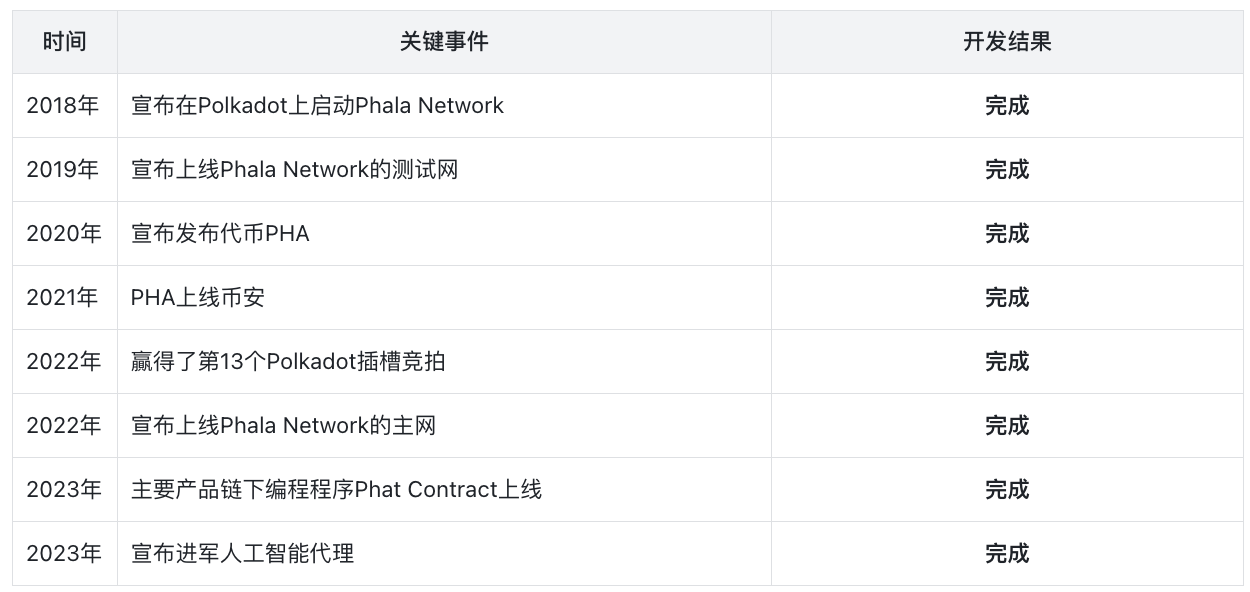
Looking at the project development roadmap of Phala Network, the team has been able to consistently complete the scheduled project plans at various key points in the project. This indicates that the technical development team led by Marvin Tong and Hang Yin is very strong. Although Phala Network has broader prospects after entering the AI track, it will face greater technical challenges, requiring higher demands on the technical development team.
Technical Features
Phala Network is a privacy computing infrastructure based on the Polkadot ecosystem, aiming to achieve data confidentiality and privacy protection through trusted execution environment (TEE) technology, cloud computing services, and cross-chain data confidentiality layers. At the same time, Phala Network uses an artificial intelligence coprocessor to provide a secure and verifiable computing solution for integrating encryption and artificial intelligence at the application layer.
In simple terms, Phala Network has added an artificial intelligence coprocessor on top of its original privacy computing infrastructure, allowing the deployment of artificial intelligence agent contracts on Phala Network, making Phala Network the execution layer for Web3 artificial intelligence. Phala Network has implemented privacy protection through TEE technology, and now its artificial intelligence agent contracts can access top LLMs and the control originates from smart contracts written on the chain.

Diagram of Phala Network's AI Agent (Image source: Phala Network Whitepaper)
Before adding the artificial intelligence agent contract, Phala Network's main technical features were achieved through various technical means to ensure data confidentiality and privacy protection. Firstly, Phala Network uses hardware privacy computing technology, especially trusted execution environment (TEE), to ensure the confidentiality and integrity of data during computation. All computations running in TEE guarantee the correctness of program execution and the security of data. Additionally, Phala Network combines zero-knowledge proof technology, which can achieve private transactions, allowing smart contract data to remain private, thus protecting user privacy. Through this approach, Phala Network is able to provide universal and easy-to-use confidential smart contracts, supporting zero-trust cloud services.
The key focus is on the trusted execution environment (TEE) and the multi-layer key rotation system.
Trusted Execution Environment (TEE): The Trusted Execution Environment (TEE) is a privacy-focused technology that isolates the code execution and operations of nodes from the main operating system of the computer processor. Phala Network uses Intel's Software Guard Extensions (SGX) for TEE processing. This system ensures that even individuals with physical access, such as Phala Network operators or malicious third parties, cannot view the node's status or manipulate the data processed by the node. TEE is typically used as an alternative to zero-knowledge proofs (ZKPs). In Phala Network, TEE is used not only to protect the confidentiality and integrity of data but also to support complex computing tasks. For example, by transferring the execution of smart contracts to off-chain secure workers supported by TEE, Phala Network can fully utilize the computing power of individual workers without worrying about the risk of data leakage or tampering.
Multi-layer Key Rotation System: Phala Network has a set of special working nodes called "Gatekeepers," whose main task is to ensure the security of computations. In Phala Network, Worker nodes do not have the permission to exit the network at any time, so tasks need to be deployed to redundant Worker nodes with the same key to ensure access to encrypted inputs, outputs, and program states. Gatekeeper nodes are responsible for managing encryption keys and dynamically allocating secrets to worker nodes to ensure the security and integrity of data. Additionally, Phala Network employs a comprehensive key rotation mechanism to ensure the privacy of its contracts and the overall security of the system. This process periodically updates the main key according to election rules. New gatekeepers are elected in a new cycle, and a new main key is generated through a secure key exchange protocol. The new key is used to re-encrypt the gatekeeper state, then distributed and confirmed among the new gatekeepers. During this transition period, communication between miners and gatekeepers is temporarily interrupted to maintain consistency and security. Communication resumes only after the key rotation is completed, with a delay of two on-chain confirmations. In addition to rotating the main key, Phala Network also regularly updates cluster keys and contract keys to enhance security.
After adding the artificial intelligence agent contract, Phala Network's main business has transitioned from its original privacy computing infrastructure to the execution layer for Web3 artificial intelligence. Its original privacy computing infrastructure now serves as the foundation for the current Web3 artificial intelligence execution layer. The existing artificial intelligence agent contracts operate on top of the original privacy computing infrastructure.
Artificial Intelligence Agent Contract: The artificial intelligence agent contract is a tool for users to build smart contracts, allowing them to control artificial intelligence agents that can run on or off the blockchain. The code for these artificial intelligence agents is written in TypeScript/JavaScript and executed within Phala Network's nodes. They can aggregate data from external APIs and insert custom artificial intelligence agents. The artificial intelligence agents utilize Phala Network's trustless cloud computing infrastructure for off-chain confidential programs. At the technical level, the artificial intelligence agent contract runs on the TEE within the worker nodes managed by Phala Network. A subset of gatekeeper worker nodes is responsible for managing keys to ensure network security. These contracts provide developers with powerful tools to leverage artificial intelligence agents for various tasks, ensuring the security and privacy of sensitive data when processing it. The development of artificial intelligence agent contracts provides new possibilities for the application of blockchain technology and offers developers more innovative space.
pRuntime: Worker nodes ensure the integrity and privacy of code execution by hosting artificial intelligence agent contracts within the TEE, protecting the workloads from malicious attacks and tampering while providing powerful computing capabilities to the network. pRuntime (Phala Runtime) is a program running within the TEE, serving as a core component of Phala Network's worker nodes. pRuntime is responsible for receiving and running computing tasks from the blockchain, ensuring the integrity and security of computations.
In summary, Phala Network has introduced artificial intelligence agent contracts, making it simple to run artificial intelligence agents like smart contracts and allowing them to be managed and accessed like smart contracts. The agents can freely call each other, forming complex applications, all running within the TEE to ensure code integrity and privacy. This allows Phala Network to fully leverage the advantages of its previous privacy computing infrastructure in transitioning to the Web3 artificial intelligence execution layer.
Innovation Compared to Similar Projects
After introducing the artificial intelligence coprocessor, Phala Network's underlying project logic has not changed, but its main narrative has shifted from the privacy computing infrastructure track to the sub-track of the AI track: the algorithm track. Its competitors now include Morpheus, QnA3.AI, Fetch.AI, SingularityNet, ChainGPT, and others.
Strong Privacy Protection: Due to its previous involvement in privacy computing, Phala Network inherently possesses strong privacy advantages. It uses hardware privacy computing technology, especially TEE, to ensure the confidentiality and integrity of data during computation. All computations in TEE guarantee the correctness of program execution and the security of data. It also combines zero-knowledge proof technology to achieve private transactions, protecting smart contract data from being publicly disclosed and safeguarding user privacy. Through this approach, Phala Network provides a secure and reliable privacy computing solution, offering solid technical support for privacy protection in blockchain applications.
Powerful Functionality: Phala Network's introduction of artificial intelligence agent contracts gives it a significant advantage in the artificial intelligence agent track. These contracts make it simple to run artificial intelligence agents like smart contracts, allowing them to be managed and accessed like smart contracts, and enabling EVM smart contracts to extend their functionality off-chain, greatly improving the deployment and operational efficiency of artificial intelligence agents. This makes artificial intelligence agents the center of attention in smart contracts.
Rich Integration: Through the use of artificial intelligence agent contracts, Phala Network can aggregate data from external APIs and insert custom AI agents, eliminating the learning difficulties of accessing decentralized applications. This allows for easy and large-scale integration of external AI tools and projects, such as OpenAI, LangChain, and GPT4.
Wider Applications: The use of artificial intelligence agent contracts makes the deployment of Phala Network's artificial intelligence agents simple and broad, allowing users to link their custom-made artificial intelligence agents to social, DeFi, or DAO applications to improve efficiency in their work and daily lives.
In conclusion, Phala Network's superior performance has made the deployment and use of artificial intelligence agents very simple, addressing concerns about ease of operation and deployment while also addressing some users' privacy concerns, giving Phala Network a significant advantage in the AI track competition.
Project Model
Business Model
Due to Phala Network's shift from privacy computing to the AI track, its economic model consists of four roles: miners, staking users, users of the artificial intelligence agent contract, and users of privacy computing.
Miners: They provide network computing power by offering their computer CPU power to Phala Network. Miners are the only ones responsible for actual computations in the network and are the foundation of the entire network. The more computing power they provide, the more substantial their rewards.
Staking Users: In Phala Network's mining design, miners need to stake a certain amount of PHA tokens as collateral to prevent malicious behavior. Staking users can be divided into Stakepool and Vault users. Stakepool users provide computing power and are willing to stake tokens, while Vault users can deposit tokens into a Vault, which then stakes them based on the performance of each Stakepool.
Users of the Artificial Intelligence Agent Contract: These users are the primary users of the Phala Network project. They run artificial intelligence agent contracts on Phala Network and pay fees to the network in the form of PHA tokens, which is one of Phala Network's main sources of income.
Users of Privacy Computing: Despite the shift to the AI track, Phala Network still attracts users with a genuine need for privacy computing. The fees paid by users of privacy computing are also one of the main sources of income for miners and Phala Network.
The income of Phala Network comes from the fees paid by users of the artificial intelligence agent contract and users of privacy computing.
Token Model
According to the whitepaper, the total supply of PHA is 1 billion, with a current circulation of 738.3 million, resulting in a circulation rate of 73.83%. The overall token distribution is as follows:
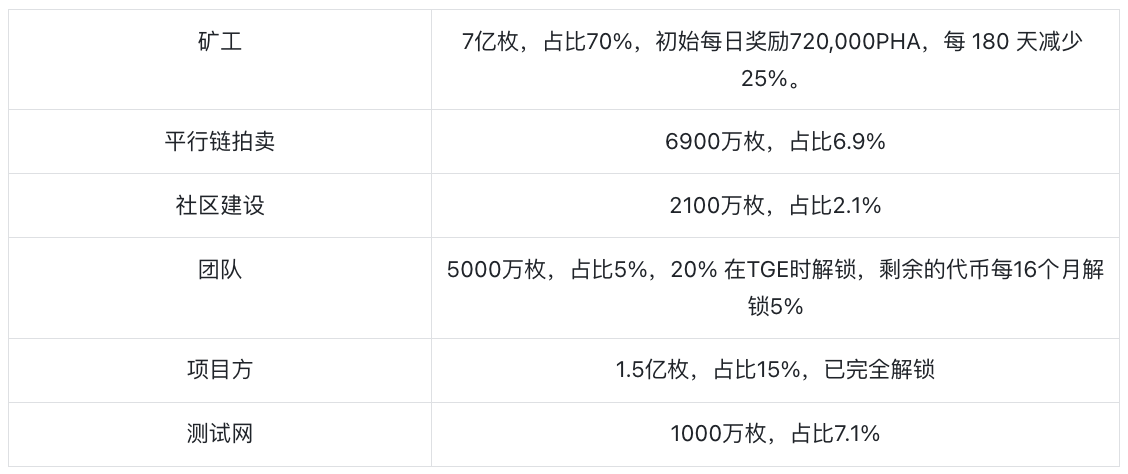
Token Empowerment:
According to the whitepaper, PHA in Phala Network has the following uses:
- Miner Rewards: Miners in the network receive PHA tokens for mining new blocks, provided they offer computing power.
- Usage Fees: Users of the artificial intelligence agent contract and privacy computing pay fees in PHA tokens.
- Governance Participation: Staking PHA tokens allows participation in PhalaDAO governance.
- Staking Participation: Miners need to stake a certain amount of PHA tokens as collateral in Phala Network's mining design.
PHA Valuation
According to the whitepaper, PHA's empowerment in the Phala Network is moderate, with the inclusion of a staking mechanism, indirectly increasing the value of PHA tokens by locking them. The current circulation rate of PHA is 73.83%, which is relatively high. However, nearly one-third of the tokens have not been developed, so the future value increase of PHA tokens will mainly come from the inherent value of the Phala Network project, which is the degree of usage of the artificial intelligence agent contract by market users. If usage is high, the token price will rise, leading to higher miner rewards and more miners entering to reduce the circulation rate, forming a positive cycle. However, PHA tokens do not have a scenario of concentrated or regular burning, which is a shortcoming in its token economics. If the business of Phala Network does not develop well, the token price will not rise.
Token Price Performance
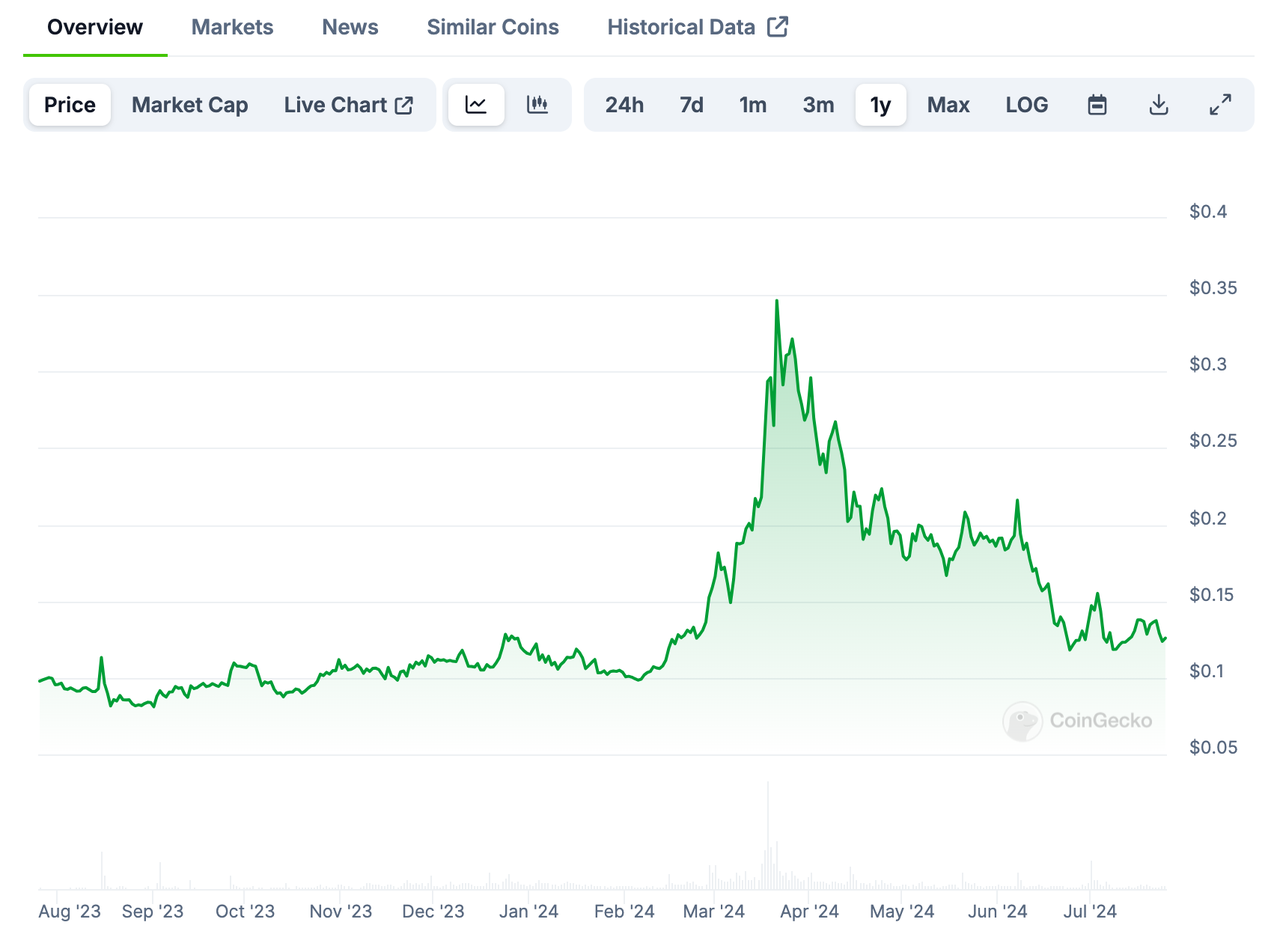
PHA Price Trend (Data Source: https://www.coingecko.com/en/coins/phala-network)
According to Coingecko statistics, PHA has risen by over 4 times in the past year since July 2023 (from a low of $0.0816 to a high of $0.3465). The main trading venues are Binance, OKX, HTX, and other top-tier exchanges. This year's increase is mainly due to the dividends from the development of the AI track.
Market Capitalization
The current price of PHA is $0.126, with a circulating supply of 738,334,838 tokens, resulting in a market capitalization of $93.43 million.
Fully Diluted Valuation (FDV)
The current price of PHA is $0.126, with a total supply of 1 billion tokens, resulting in a market capitalization of $126.54 million.
Average Daily Trading Volume
The average daily trading volume of PHA is approximately $5.66 million.
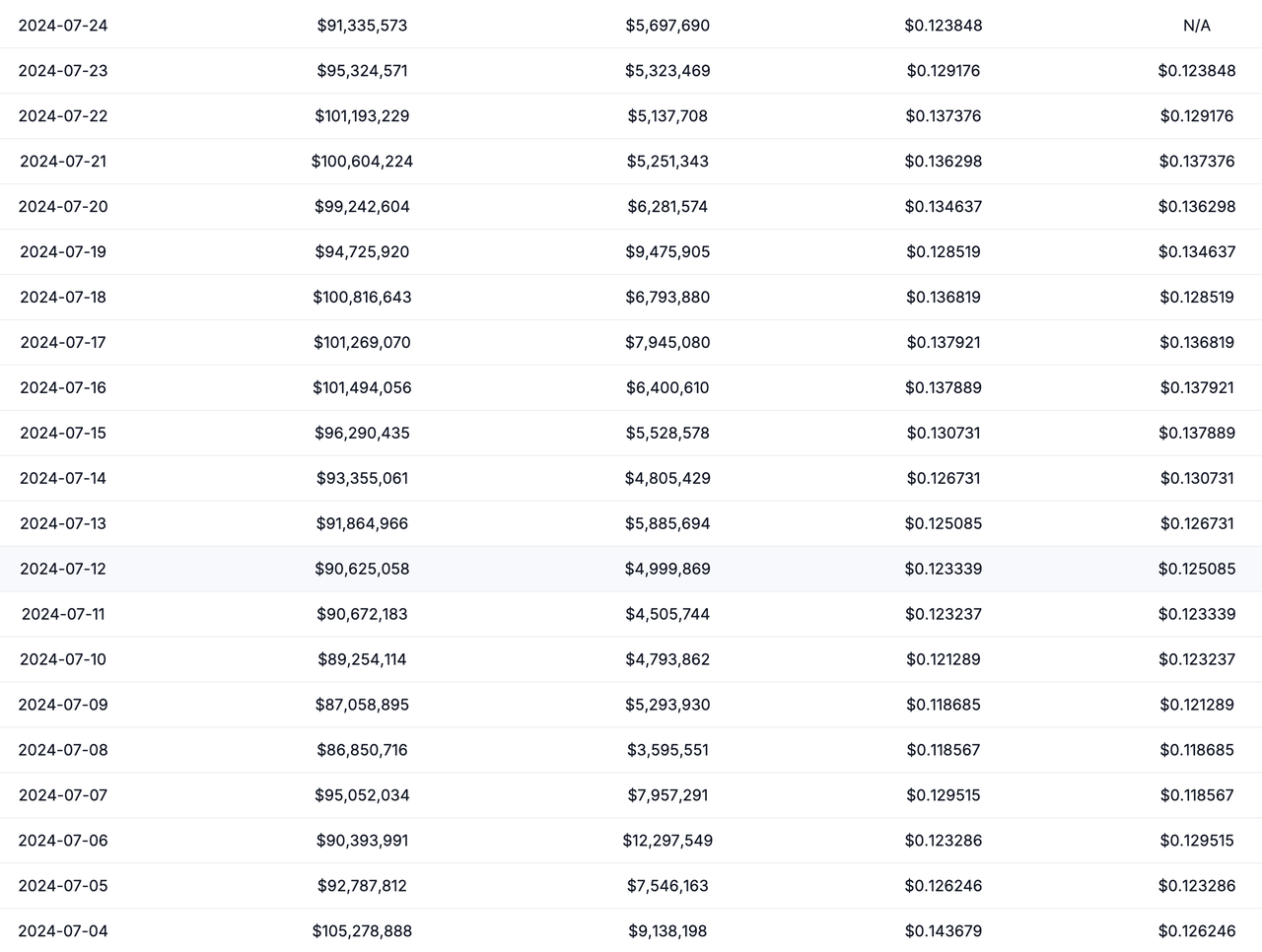
PHA Daily Trading Volume (Data Source: https://www.coingecko.com/en/coins/phala-network/historical_data)
PHA's daily trading volume is $5.66 million, with a circulating market capitalization of approximately $126.54 million. Although the turnover rate is only 4.47%, which is relatively low, it is mainly due to the current overall market environment being subdued. The recent impact of the Mtgox incident has led to most users adopting a wait-and-see attitude.
Top Ten Token Holder Addresses
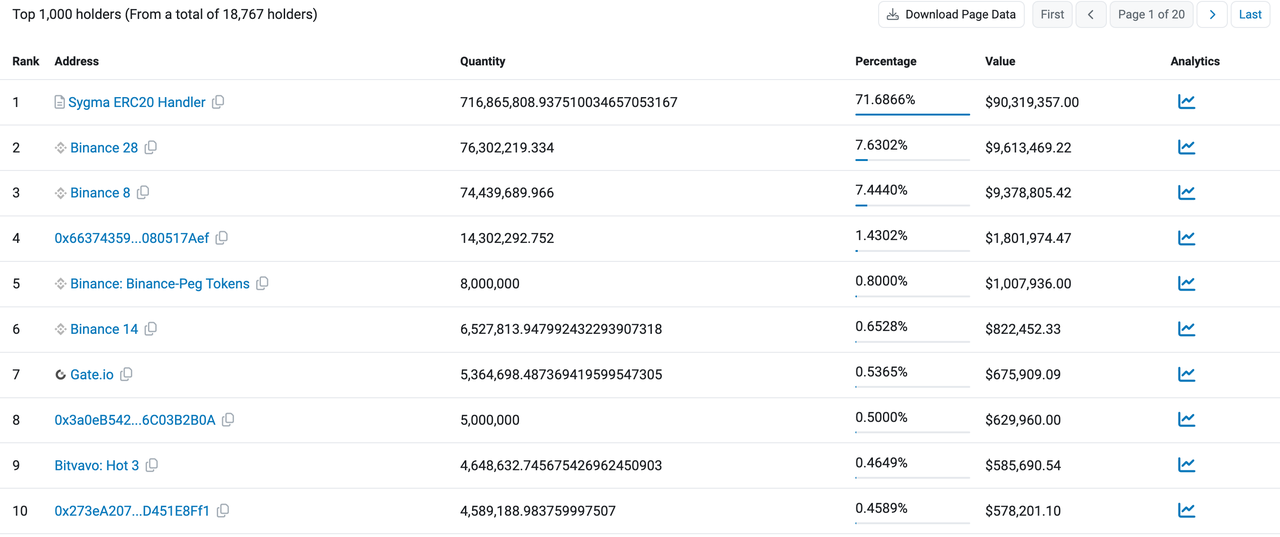
Top Ten PHA Holder Addresses (Data Source: https://etherscan.io/token/0x6c5bA91642F10282b576d91922Ae6448C9d52f4E#balances)
The top ten PHA holder addresses collectively hold 92.19% of the total PHA tokens.
Number of PHA Holders
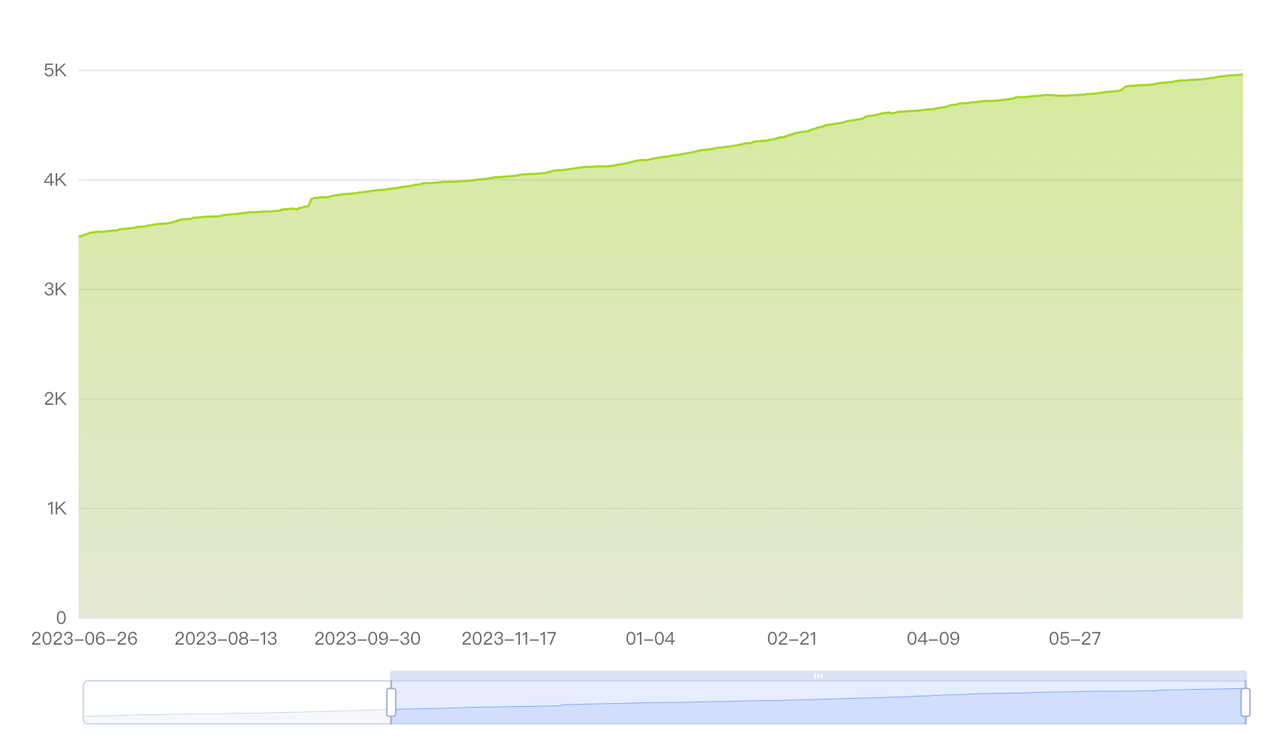
Number of PHA Holders (Data Source: https://phala.subscan.io/tools/charts?type=holder)
The number of PHA token holders has been steadily increasing over the past year.
Daily Active Accounts
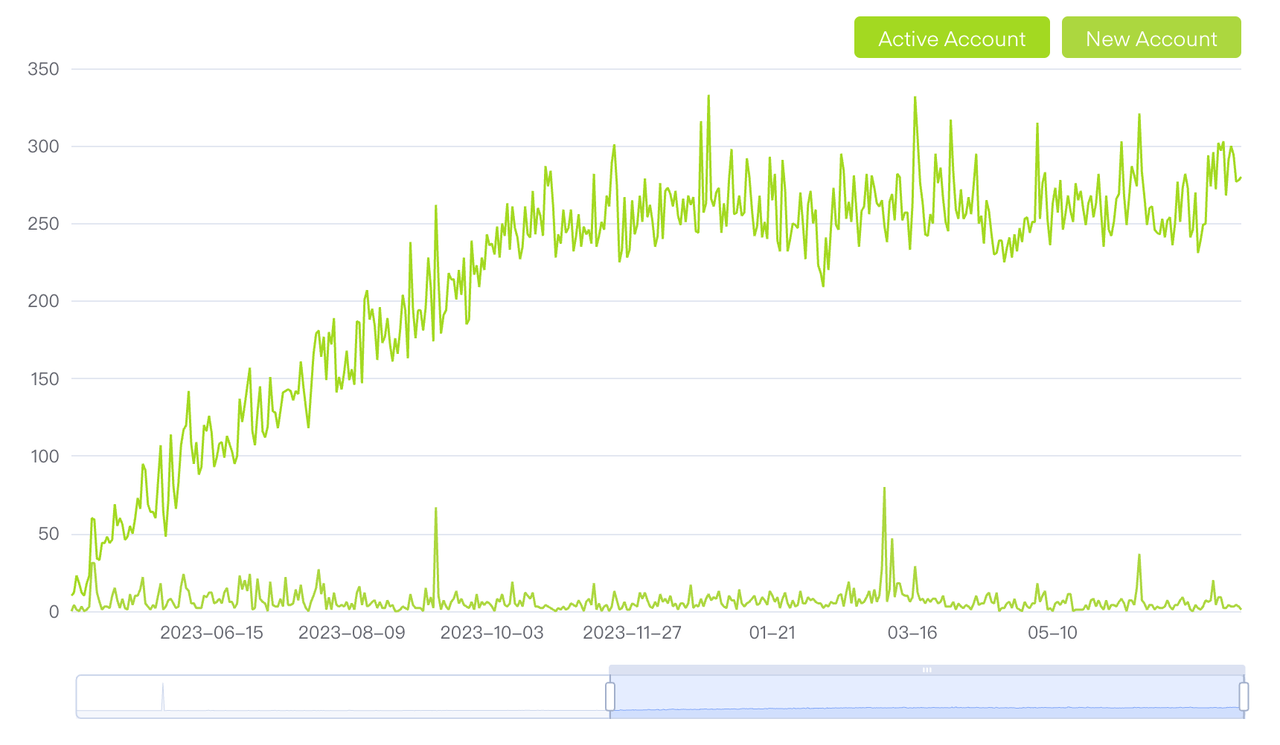
Daily Active Accounts (Data Source: https://phala.subscan.io/tools/charts?type=account)
It can be seen that the number of daily active accounts on Phala Network has been steadily increasing over the past year.
Staking Situation
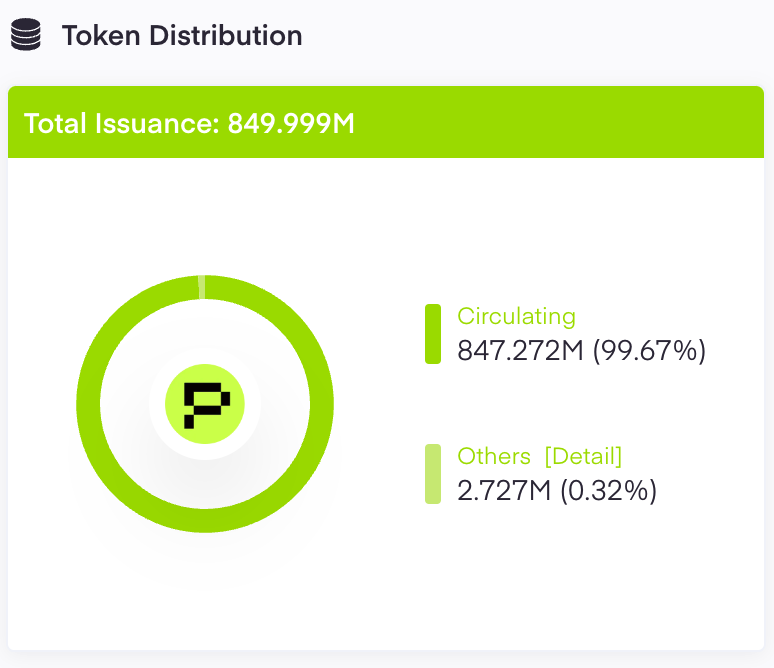
Actual Circulation of PHA (Data Source: https://phala.subscan.io/)
From the chart, it can be observed that the actual circulation of PHA should be 847.27 million tokens, but the actual circulating supply is 738.33 million tokens, indicating that the actual staked amount should be 108.94 million tokens.
Project Risks
Although Phala Network has shifted its project track to the AI track after launching the artificial intelligence agent contract, which is beneficial for its project development and token price growth, it also faces exponentially increasing technical challenges. Especially, Phala Network has adopted a relatively complex artificial intelligence agent contract on the basis of privacy computing, and will continue to integrate new AI Agents in the future, posing significant challenges to its technical team. Therefore, there will inevitably be some system issues in the future, which will depend on the problem-solving capabilities of the Phala Network team and whether the artificial intelligence agent contract of Phala Network is as powerful as advertised. Currently, there are many uncertainties.
Conclusion
Phala Network has made artificial intelligence agents as easy to run as smart contracts and managed by smart contracts, enabling real-time management and access control of artificial intelligence agents. Different artificial intelligence agents can freely call each other to build complex applications, and all operations are performed in a trusted execution environment (TEE) to ensure code integrity and privacy. This allows Phala Network to fully leverage its previous advantages in privacy computing infrastructure and transform it into a Web3 artificial intelligence execution layer. This innovation provides a new solution for the security and privacy protection of artificial intelligence applications and provides strong support for the integration of smart contracts and blockchain technology.
After the launch of the artificial intelligence agent contract, Phala Network has positioned itself in the AI track, which is beneficial for its project development and token price growth. However, the accompanying technical challenges have also increased exponentially. In particular, Phala Network has adopted a complex artificial intelligence agent contract on the basis of privacy computing and will continue to integrate new AI Agents in the future, posing significant challenges to the technical team.
In summary, the Phala Network project itself has gained a certain advantage in the privacy computing infrastructure track by introducing the trusted execution environment (TEE). With the addition of the artificial intelligence agent contract, if it can proceed according to the project's subsequent plans, Phala Network will also have a certain advantage in the AI track.
References
Understanding Phala Network: A Comprehensive Overview
DePin Project in the Polkadot Ecosystem, Can Phala Network Break Through?
免责声明:本文章仅代表作者个人观点,不代表本平台的立场和观点。本文章仅供信息分享,不构成对任何人的任何投资建议。用户与作者之间的任何争议,与本平台无关。如网页中刊载的文章或图片涉及侵权,请提供相关的权利证明和身份证明发送邮件到support@aicoin.com,本平台相关工作人员将会进行核查。




